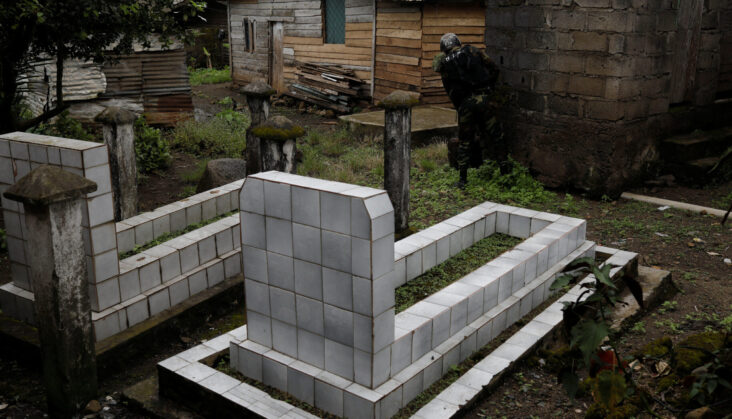[ad_1]
The clash, which occurred over the nights of 25 and 26 June, is emblematic of an ongoing war between the Anglophone fighters and the Cameroonian Security Forces. The situation has reached a boiling point as recent arms circulation has further aggravated both sides.
Reuters reported that this weekend’s violence began when attackers from the neighbouring community of Mavass, alongside hired militia, stormed a funeral on Saturday 25 June. Many are injured or missing and the village’s Integrated Health Center was burnt down, further impacting the isolated communities.
According to the local Presbyterian Church, the conflict began on 29 April, after the Oliti attacked several Messaga Ekoi farms, leading to retaliating attacks. Rt Reverend Fonki Samuel Forba said, “The Oliti people then mobilised and got the backup of hired armed men and launched a very violent, inhuman and destructive attack on the Messaga Ekol people.”
History of the #Akwaya attack according to the Presbyterian Church of #Cameroon pic.twitter.com/HZczeOAs6Z
— Aurore BONNY (@Aurore_Bonny) June 27, 2022
According to Forba, many houses were burnt down, some with people still inside them. The reverend added: “The tension between these two communities is boiling. The perpetrators of this evil and wickedness should be urgently brought to justice to preempt any further escalation.”
Senseless violence
Images online show children lying dead alongside their parents – the main victims of the violent attack.
Casualty rates have varied: the Women’s Peacebuilder’s network has reported “more than 32” dead while some outlets have reported “at least 50 people”, among the fallen, six Nigerian civilians. The disputed news reflects the ongoing volatility of the region, as the government does little to quell the conflict.
Human Rights Watch said today that the Armed Separatist fighters have committed “grave human rights abuses across Cameroon’s Anglophone regions since January 2022”.
Ilaria Allegrozzi, a senior central Africa researcher at Human Rights Watch, believes that the separatist groups pose a serious threat to civilians, without consequence.
“Armed separatist groups are kidnapping, terrorizing, and killing civilians across the English-speaking regions with no apparent fear of being held to account by either their own leaders or Cameroonian law enforcement.”
Anglo vs Franco Cameroon
The scars of colonisation are very much at the forefront of the anglophone/francophone divide in the country, leading to to the push for secession in the south west.
Clashes erupted in the English-speaking regions of Cameroon in 2017 between the separatist movement the Ambazonia Defence Forces (ADF) and the country’s government after civilian protests were violently quashed.
 Source: REUTERS GRAPHICS
Source: REUTERS GRAPHICS
Root of the problem
While some have blamed new arms shipments filtering through the communities, others point the figure at the government for failing to provide basic necessities and creating disillusionment in the people.
Human rights activist Kah Walla tweeted on Monday that the “state’s inability to provide basic services such as water, schools, jobs… is unquestionably linked to the ability of extremist groups to recruit.”
Decades-old absence of the State in remote areas in #Cameroon is a key root cause of conflicts which appear intractable today.
State’s inability to provide basic services such as water, schools, jobs… is unquestionably linked to the ability of extremist groups to recruit.
— Kah Walla (@KahWalla) June 27, 2022
Just over half of Cameroon’s population has access to basic drinking water, and recent inflation across the continent has created desperate conditions for many in rural areas.
[ad_2]
Source link
